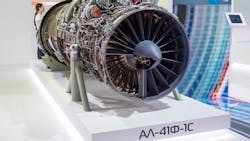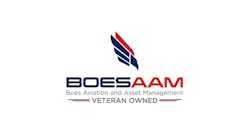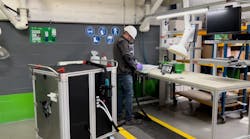From designing wheels to designing flying cars, man has come a long way with his thirst for innovation. A few years ago, hyperspeed jets and flying cars were only part of science-fiction stories. But they are quickly becoming reality. With the rapid launch of prototypes of new aircraft, successful tests and fully functioning flight models, the future of aircraft is certainly bright. And at the core remains a gearbox that is constantly evolving.
The aircraft gearbox is the most vital component of the transmission system for changing rotational speed and is instrumental for an operational engine. It is used to increase output torque or to vary the speed (RPM) of a motor. The gearbox is connected with shafts and through the internal configuration of a gearbox, the output torque and speed are determined. Over the last couple of years, air traffic has increased exponentially across the globe, especially in developing nations such as India, UAE and China. The aviation industry now demands lightweight engines with high efficiency and improved performance. According to Allied Market Research, the increased need for efficient aircraft engine with enhanced gearbox drive the growth of the global aircraft gearbox market.
Covid-19 Pandemic Presents Unprecedented Challenges
The demand for aircraft gearboxes in the defense sector has rapidly increased and major market players have been investing in developing lightweight gearboxes that can be a part of defense aircraft have boosted the market growth. However, the colossal initial investment and engine limitations at high altitudes are still some of the challenges that yet to be overcome. Apart from this, the awareness regarding environmentally-friendly vehicles has gravely affected the aviation industry. This popularity will affect the growth of aircraft gearboxes and encourage market players to introduced unique, eco-friendly gearboxes in the coming years.
While the demand for aircraft gearboxes witnessed a steady growth, the Covid-19 pandemic severely affected the industry. Even the major aircraft gearbox companies experienced operational issues to disruption in the supply chain and lack of site access. Several governments declared nationwide lockdown, which forced companies to close their manufacturing facilities.
The prolonged lockdown in various countries directly affected the defense organizations and compelled them to delay the procurement of aircraft gearboxes from their suppliers. Moreover, the complete cancellation of international and domestic flights to curb the spread of the virus, hampered the demand for aircraft gearboxes. This exerted tremendous financial stress on market players due to the rise in inventory carrying cost of aircraft gearboxes.
However, as the world is slowly recovering from the Covid-19 pandemic, there is a ray of hope for the aviation industry. As the ban on international flights is being lifted, the demand for aircraft would soon rise and enable the market to get back on track. What’s more, several companies have already launched their new aircraft and improved gearbox to strengthen their market position.
Sustainability Drives The Aviation Industry
Innovation in aircraft and its engine is the only way forward for the leading companies in the aviation industry. For instance, Rolls-Royce, a leading market player in the automotive industry, recently announced its involvement in the UltraFan aero engine at its DemoWorks facility in the UK with a 50MW power gearbox. The company aims to complete the prototype engine by 2021.
UltraFan engines are expected to have a 140in fan diameter and can power widebody and narrowbody aircraft. The company has designed the engine specifically to cater to the needs of such aircraft and it is said to increase fuel efficiency by around 25 percent compared to the first-generation Trent engine. Considering the increase in awareness regarding the use of sustainable aviation fuel, Rolls-Royce confirmed that the test run of the engine would use sustainable aviation fuel.
UltraFan aero engine is a vital part of the company’s IntelligentEngine Vision. As the world has increased the demand for sustainable ways to travel across the globe, this initiative of the company would help it become a part of the solution post-pandemic.
Apart from this, GE Aviation, a subsidiary of General Electric and Safran, an international high-technology group has launched a technology-driven program to develop sustainable aircraft engines. The program would target developing technology that demands 20 percent less fuel consumption and CO2 emission compared to existing alternatives. Moreover, it would demonstrate a whole new range of novel technologies for futuristic engines that could enter the market in the mid-2030s.
The companies have signed an agreement of partnership to the year 2050 to encourage the development of sustainable ways to manufacturing engines, gearboxes for next-generation aircraft. John Slattery, the president, and CEO of GE Aviation stated that this technology demonstration program would help reinvent the future of the aviation industry and would bring disrupting technologies to the market Moreover, it would help the company’s mission to find sustainable ways in the aircraft industry by reducing the CO2 emission and fuel consumption.
Increased Demand for Electric Aircraft
If you have been following the trends in the automotive industry, you must be aware of the ever-increase demand for all-electric, lightweight vehicles. Similarly, the aircraft industry is riding the wave of all-electric and hybrid-electric engines.
Leonardo Helicopters, the Italian helicopter manufacturer and provider for commercial and military operations, recently announced its plans to develop a hybrid-electric-powered lightweight helicopter. During the press briefing, the company confirmed that it would use its novel AW09 aircraft for the new project.
The AW09 is a single-engine helicopter developed by Kopter, a subsidiary of Leonardo Helicopters. As per Michele Riccobono, Kopter’s chief technology officer, the prototype would include some important changes in the design of its aircraft. The upcoming innovation would increase innovations in the main rotor head, gearbox, extended rotor mast and improvements to flight controls. The prototype would be unveiled in the second half of this decade.
Launch of Aircraft Hospital for Quick Maintenance
Maintenance is one of the major expenses for end-users in the aircraft market. thus, GA Telesis Engine Services OY (GATES), a leading engine heavy maintenance unit of GA Telesis, a prominent aviation integrator recently announced the launch of its aircraft hospital. The Special Procedures Aeroengine Hospital (SPAH) shop would focus on specialized aircraft engine repairs that demand targeted or limited maintenance.
The hospital would offer a mobile response team that would focus on engine field maintenance and on-wing support along with accessory gearbox repairs. SPAH is an independent facility in Helsinki that opened in July 2020. While this business unit showed immediate success since its launch, now it aims to meet the future demand by joining forces with Air Transport Services Group and GA Telesis to develop a second SPAH in the U.S. this expansion would benefit the company to meet customer demands.
To Sum it All
Aircraft are the way of the future. However, the demand for sustainability and a greener future will affect the designing and manufacturing of aircraft gearboxes.
The increase in partnerships of market giants to find more sustainable ways of flight has opened lucrative opportunities in the aircraft gearbox industry. Several companies have announced competitions to launch efficient aircraft engines and minimize their maintenance costs. Such collaboration of companies would lead the industry to its greener future and make the aircraft industry more sustainable than ever.
https://www.alliedmarketresearch.com/aircraft-gearbox-market
Swamini Kulkarni holds a bachelor’s degree in Instrumentation and control engineering from Pune University and works as a content writer at Allied Market Research. She is deeply fascinated by the impact of technology on human life and loves to talk about science and mythology. When she is not glued to the computer, she loves to read, travel and daydream about her areas of interest.




